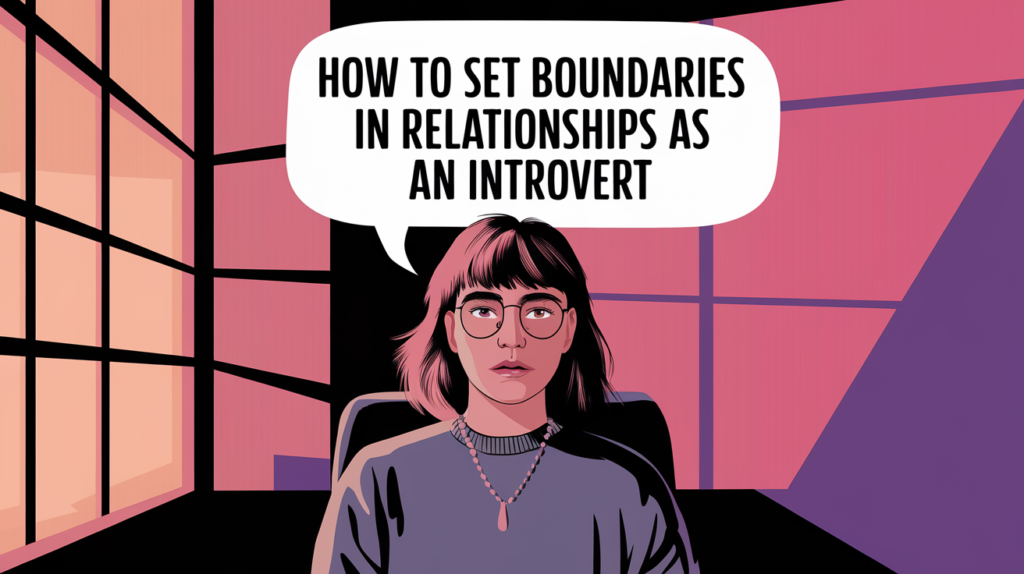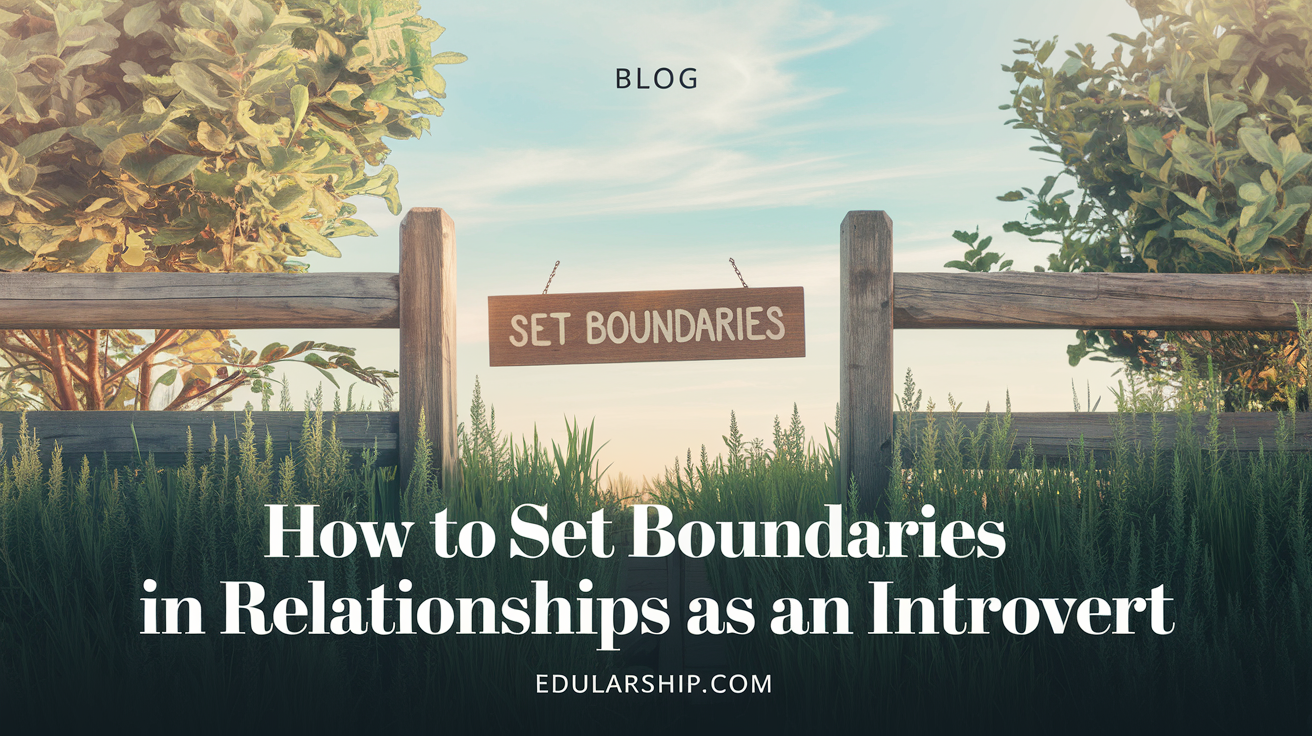Setting boundaries in relationships can be tough for introverts. They need time alone to recharge, but also want to maintain healthy connections. Introverts often find social interactions draining. This makes setting boundaries crucial for their well-being. Healthy boundaries help maintain a balance between personal space and social time. They prevent feelings of overwhelm and stress. Understanding how to establish these boundaries can lead to healthier, more fulfilling relationships.
In this guide, we’ll explore practical ways to set and maintain boundaries as an introvert. This will help you protect your energy while nurturing your relationships. Ready to learn how? Let’s dive in!

Importance Of Boundaries
Setting boundaries is crucial for maintaining healthy relationships, especially for introverts. Boundaries help define personal limits and create a safe space. They ensure that introverts can recharge and maintain their mental well-being. Without boundaries, introverts may feel overwhelmed and exhausted, affecting their overall happiness.
Why Boundaries Matter
Boundaries matter because they help to protect your personal space. Introverts need time alone to recharge. Without boundaries, this becomes difficult. Boundaries also help to communicate your needs clearly. They prevent misunderstandings and ensure mutual respect in relationships. Effective boundaries lead to healthier and more fulfilling interactions.
Impact On Mental Health
Boundaries have a significant impact on mental health. They reduce stress and prevent burnout. Introverts often feel drained after social interactions. Clear boundaries allow them to take necessary breaks. This helps to maintain their energy levels and mental well-being.
Setting boundaries also helps in managing anxiety. It provides a sense of control over one’s environment. Knowing that you can say no when needed reduces feelings of being overwhelmed. This leads to improved mental health and a better quality of life.
Understanding Your Needs
Understanding your needs is crucial for setting boundaries as an introvert. Knowing what you need helps you stay balanced and happy in your relationships. It’s important to take time to reflect on your personal limits and recognize the traits that make you an introvert.
Identifying Personal Limits
Personal limits are the thresholds where you feel comfortable and safe. You need to identify these limits to communicate them clearly. Reflect on situations that make you feel drained. Notice when you need alone time to recharge. These are signs of your personal limits. Write them down to remember them easily.
Recognizing Introverted Traits
Introverts prefer calm and quiet environments. They often find social interactions exhausting. Recognizing these traits helps you understand your needs better. If you value deep conversations over small talk, note that. If you prefer one-on-one meetings, acknowledge it. Your introverted traits shape your boundaries.
Understanding your needs as an introvert is the first step to setting effective boundaries. By identifying personal limits and recognizing your introverted traits, you can create a balanced and fulfilling relationship.
Communicating Clearly
Communicating clearly is crucial for introverts setting boundaries in relationships. It helps in expressing needs without miscommunication. Clear communication builds trust and understanding. This section will guide you on expressing yourself and using assertive language.
Expressing Yourself
Introverts often struggle with expressing their feelings. You may feel overwhelmed or misunderstood. Start by understanding your own needs. Reflect on what makes you comfortable or uncomfortable. Write down your thoughts if it helps.
Once you know your needs, share them with your partner. Use simple and direct language. Avoid long explanations or apologies. Keep it short and to the point. For example, say, “I need some alone time after work.” This is clear and respectful.
Using Assertive Language
Assertive language is key to setting boundaries. It shows confidence without being aggressive. Use “I” statements to express your feelings. For example, say, “I feel stressed when I don’t have time alone.”
Avoid blaming or criticizing others. Focus on your feelings and needs. This reduces defensiveness in your partner. Be firm but kind. Say what you need and stick to it.
Practice makes perfect. The more you use assertive language, the easier it becomes. Over time, it will feel natural and help maintain healthy relationships.
Setting Physical Boundaries
Setting physical boundaries as an introvert is essential for maintaining your well-being. These boundaries help you protect your personal space and ensure you have enough alone time. Let’s explore how to set these boundaries effectively.
Personal Space
Personal space is crucial for introverts. It is where you can recharge and feel safe. Make it clear to your loved ones that your personal space is important to you. You can start by explaining the need for a designated area where you can be alone. This space could be a room or a quiet corner in your home.
Respecting personal space involves understanding and communicating your limits. You may need to set rules about physical touch or the distance others should keep. For example, you can politely ask for some space during conversations or gatherings. Clear communication helps others understand and respect your needs.
Alone Time
Alone time is another vital aspect of setting physical boundaries. Introverts recharge by spending time alone. Make it known that you need regular periods of solitude. You can schedule alone time into your daily routine. This time can be used for activities that help you relax, like reading or walking.
Setting aside alone time requires consistency. Inform your friends and family about your need for this personal time. It is okay to say no to social invitations if you need to recharge. Setting these boundaries will help you maintain a healthy balance between social interactions and personal time.
Managing Emotional Boundaries
Being an introvert means you value your alone time. This is crucial for your well-being. Setting emotional boundaries in relationships is essential. It helps you manage your energy and emotional labor. Let’s dive deeper into how you can handle this.
Handling Emotional Labor
As an introvert, taking on too much emotional labor can be draining. Emotional labor involves caring for others’ feelings and needs. It’s important to set clear boundaries. Here are a few steps to manage this better:
- Communicate your limits: Be honest about your emotional capacity.
- Use “I” statements: Express your needs clearly. Say, “I need some time to recharge.”
- Set specific times: Allocate certain times for deep conversations.
These steps will help you protect your emotional well-being.
Protecting Your Energy
Introverts recharge by spending time alone. Protecting your energy is key to maintaining balance. Here’s how you can do it:
- Schedule alone time: Block out time in your calendar just for yourself.
- Practice self-care: Engage in activities that rejuvenate you. This could be reading, meditating, or taking a walk.
- Limit social interactions: Avoid overcommitting to social events.
By setting these boundaries, you can ensure you have enough energy for yourself and your loved ones.

Maintaining Boundaries
Maintaining boundaries in relationships is crucial, especially for introverts. It helps protect your energy and ensures mutual respect. Clear boundaries can create healthier interactions and make your relationships more fulfilling. But how do you maintain these boundaries effectively? Let’s explore some key strategies.
Consistency Is Key
Consistency helps reinforce your boundaries. It shows others that you are serious about your limits. Stick to your rules, even if it feels uncomfortable at first. Over time, people will learn to respect your boundaries. This consistency builds trust and understanding in your relationships.
For example, if you need alone time, set a specific time for it daily. Make sure to communicate this need clearly. Consistency in your actions will help others recognize and respect your personal space.
Dealing With Pushback
Expect some resistance when you start setting boundaries. People may push back, especially if they are used to having unrestricted access to your time and energy. Stay firm and calm. Explain why these boundaries are important for you.
It’s important to remain patient. Sometimes, people need time to adjust to your new boundaries. If someone repeatedly ignores your limits, it may be necessary to reassess that relationship. Your well-being should always come first.
Self-care Strategies
Introverts often find it challenging to set boundaries in relationships. They need time alone to recharge. Self-care strategies can help introverts maintain their energy and well-being. Here are some effective self-care strategies for introverts.
Prioritizing Self-care
Putting yourself first is essential. Schedule time for activities that make you happy. Reading, walking, or a hobby can help. Make self-care a non-negotiable part of your routine. It is important to respect your own needs.
Recharging Techniques
Find what helps you relax and feel refreshed. Meditation can calm your mind. Deep breathing exercises can reduce stress. Spending time in nature can restore your energy. Listening to music or taking a nap can also be helpful. Experiment with different techniques to see what works best for you.
Seeking Support
As an introvert, setting boundaries in relationships can be challenging. Seeking support is crucial to maintaining your emotional well-being. Support can come from friends, family, or professionals. This section explores how to find the right kind of support to help you establish and maintain boundaries in your relationships.
Finding Allies
Finding allies is essential for introverts. Allies can be friends or family who understand your needs. They provide emotional support and help you navigate social situations. These allies can also help communicate your boundaries to others, if needed.
Here are a few tips to find and maintain allies:
- Communicate openly: Share your feelings and needs clearly.
- Be honest: Let them know about your introverted nature.
- Seek understanding: Choose people who respect your boundaries.
| Tip | Description |
|---|---|
| Communicate openly | Share your feelings and needs clearly. |
| Be honest | Let them know about your introverted nature. |
| Seek understanding | Choose people who respect your boundaries. |
Professional Help
Sometimes, seeking professional help can be beneficial. A therapist or counselor can provide tools and strategies to set boundaries. They offer a safe space to discuss your feelings and challenges.
Consider these steps to find a professional:
- Research: Look for professionals with experience in introversion.
- Ask for recommendations: Get referrals from friends or family.
- Initial consultation: Meet with a few professionals to find the right fit.
Remember, seeking support is a sign of strength. It shows you value your well-being and are taking steps to maintain healthy relationships. Whether you find allies among friends and family or seek professional help, the key is to ensure your boundaries are respected and maintained.
Conclusion
Setting boundaries is key for introverts in relationships. It helps maintain peace. Respect your own needs. Communicate clearly and kindly. Take time to recharge. It’s okay to say no sometimes. Healthy boundaries lead to stronger connections. Balance is essential. Practice makes perfect. Keep your well-being a priority. Relationships thrive when both partners feel understood.

